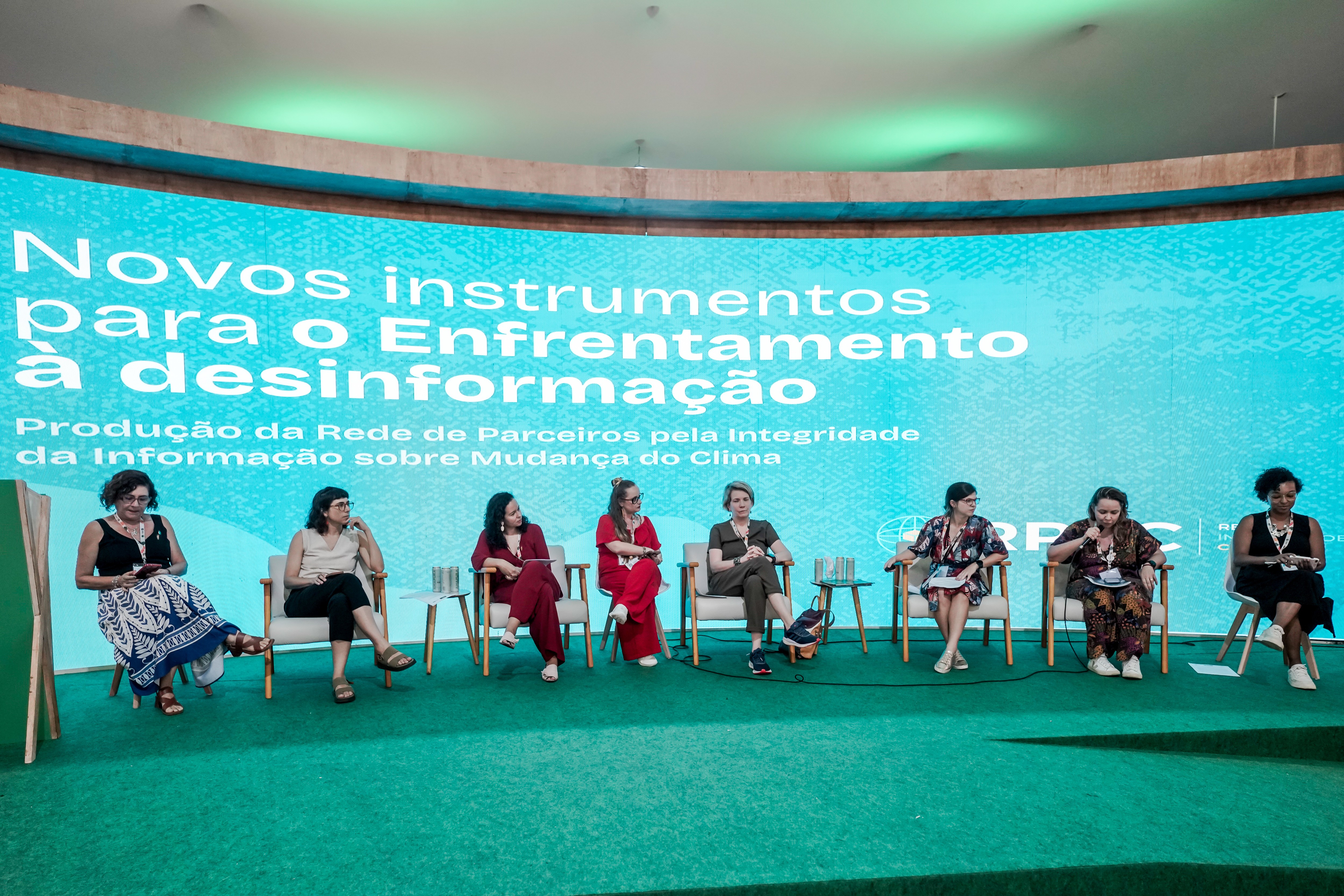Statement of Commitment on Climate Information Integrity in Digital Advertising launched at COP30
The document was presented by the Brazilian Chapter of the Global Initiative for Information Integrity on Climate Change, comprising more than 130 civil society organizations and supported by the Government of Brazil, the United Nations, and UNESCO

By Rafaela Ferreira / COP30
A Commitment Letter for Climate Information Integrity in Digital Advertising was launched on Thursday, 13 November, during the panel “Information Integrity and Climate Action in Brazil: Synergies between Government and Civil Society” at COP30. The announcement, made at the Brazil Pavilion in the Green Zone, highlighted the joint effort between government and civil society to strengthen a more transparent, reliable, and resilient information ecosystem capable of addressing climate change.
The document was presented by the Brazilian Chapter of the Global Initiative for Information Integrity on Climate Change, which brings together more than 130 civil society organizations and is supported by the Government of Brazil, the United Nations (UN), and UNESCO. The letter was developed through a collaborative process led by the Network of Partners for Information Integrity on Climate Change (RPIIC) and serves as a direct response to the growing spread of climate misinformation and greenwashing practices that distort public debate and undermine climate action.
According to Nina Santos, Deputy Secretary for Digital Policies at the Secretariat for Social Communication of the Presidency of the Republic (Secom), COP30 represents a “turning point in the environmental agenda.” She stated, “For the first time, the quality and integrity of information have become a central pillar of the climate action agenda. It is now well established that without quality information, our capacity to act on climate change is severely impaired.”
The Deputy Secretary also recalled the Declaration on Information Integrity on Climate Change, launched on Wednesday, 12 November, at COP30. The declaration, already endorsed by 12 countries, sets out shared international commitments to combat climate misinformation and promote accurate, evidence-based information.
During Thursday’s panel, in addition to the Commitment Letter, several other documents were presented: Legal Action Guide for Climate Information Integrity; Commitment Letter for Advertisers, Platforms, and Companies; Overview of the Digital Debate on Climate in Brazil; Recommendations to Promote Climate Information Integrity through the Sustainability of Journalism and the Protection of Journalists, Communicators, and Environmentalists; and a Technical Note Supporting the Draft Decree on Greenwashing.
All documents produced by the Network are available on the Initiative’s website.
About the Letter
The Commitment Letter for Climate Information Integrity in Digital Advertising warns that the spread of false and misleading information on the climate emergency undermines public understanding of risks and hinders the achievement of the goals established under the Paris Agreement. The document notes that digital platforms, advertisers, and programmatic advertising companies operate in an ecosystem characterized by massive data collection, microtargeting, and risks to individual autonomy, underscoring the need for ethical, legal, and social responsibility in the digital environment.
The text also highlights that advertising or monetizing platforms that disseminate environmental and climate misinformation threatens human rights, erodes public trust, and causes reputational harm to brands. It further emphasizes that the lack of transparency, specific regulation, and effective oversight mechanisms has facilitated manipulation of public opinion, financial fraud, and the spread of misinformation campaigns through paid and promoted content.
Letícia Capone, from the RPIIC and Director of the Instituto Democracia em Xeque, emphasized the collective nature of the document’s creation. “The first important point is that this collaborative effort, involving more than 130 organizations in coordination with the Federal Government, has been crucial to advancing the information integrity agenda. It is essential for building a communication space that is reliable, safe, and trustworthy,” she stated.
The letter also outlines commitments by advertisers, advertising companies, and digital platforms to strengthen the integrity of climate-related information. Among the measures are: avoiding greenwashing; refraining from advertising on pages that promote misinformation; blocking sites created solely for ad revenue; increasing transparency across the advertising chain; improving moderation and recommendation systems; labeling paid content; developing pre-bunking techniques; and supporting initiatives on climate literacy and responsible journalism.
Nelcina Trotta, President of the Brazilian Association of Advertisers (ABA), highlighted the importance of the initiative led by the Secretariat for Social Communication in ensuring that consumers receive accurate information. “This initiative can ensure that consumers have access to reliable information, especially on issues related to climate change,” she affirmed.
